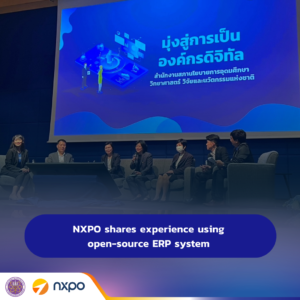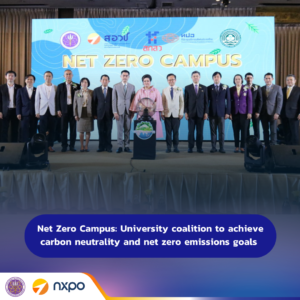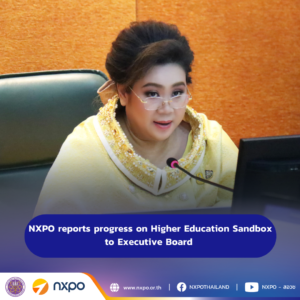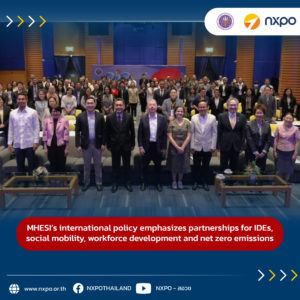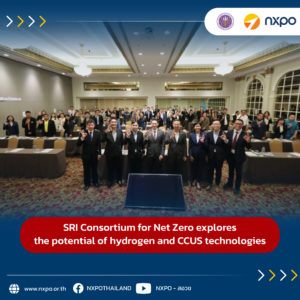The NXPO Executive Board convened on 22 October 2020 with Prof. Sirirurg Songsivilai, Permanent-Secretary of Ministry of Higher Education, Science, Research and Innovation (MHESI) chairing the meeting on behalf of MHESI Minister.

In the meeting, NXPO President Dr. Kitipong Promwong made a presentation on a white paper on strategic direction for higher education, science, research and innovation for post-COVID recovery. The white paper was formulated by NXPO aiming to serve as a strategic blueprint to employ higher education, science, research and innovation to alleviate poverty, strengthen human security, develop sustainable economy and build a strong foundation for future development. Global changes are reportedly driven by the following factors, namely the COVID-19 and other emerging infectious diseases, social inequality, the shift in global economic power, environmental degradation and resource scarcity, demographic change and aging society, and disruptive innovation. The study identified the directions for future national development as following:
- Balancing between economic, social and environmental development to build change resilience.
- Placing priority on human security in four aspects: food, healthcare, energy and job.
- Building strength from within by promoting grassroots economy to enable fair wealth distribution and self reliance in accordance with the Sufficiency Economy Philosophy.
- Creating an innovation-based economy by promoting locally-developed innovations.
- Preparing for future disruptions such as the prevalence of emerging technologies like robotics and AI.
The white paper further outlined the following recommendations on the higher education, science, research and innovation policy:
- Alleviate poverty and facilitate fair wealth distribution by unlocking the potential of local innovators and entrepreneurs and adding essential infrastructures to foster the local economy.
- Strengthen human values and social power to enable balanced development in three aspects, namely economy, environment and society.
- Implement Bio-Circular-Green Economic model (BCG) for sustainable development by converting comparative strength in biodiversity into competitive strength.
- Enhance industrial competitiveness by promoting Industry 4.0, increasing the number of tech-based enterprises, supporting frontier research, developing key infrastructures and platforms to underpin manufacturing and service sectors and supporting research in social sciences, humanities and arts to create economic and social value.
- Transform education and manpower development system and strengthen research and innovation ecosystem in order to better address national challenges and disruptions.
- Reform higher education, science, research and innovation system to facilitate sustainable development by streamlining administrations in the system so that organizations in the system can work cooperatively and synergistically to achieve the goals.
The meeting complimented NXPO for a comprehensive report on post-COVID recovery strategy and further suggested that key performance indicators (KPIs) should be set when the strategies are implemented.
In addition, the meeting also discussed an establishment of Thailand Academy of Social Sciences, Humanities and Arts (TASSHA) which was proposed by the Office of the Permanent Secretary, MHESI. TASSHA will play a key role in Thailand’s research and innovation system, not only to support the knowledge creation in social sciences, humanities and arts but also to facilitate the exploitation of this knowledge to create economic and social value and provide solutions to national challenges.






